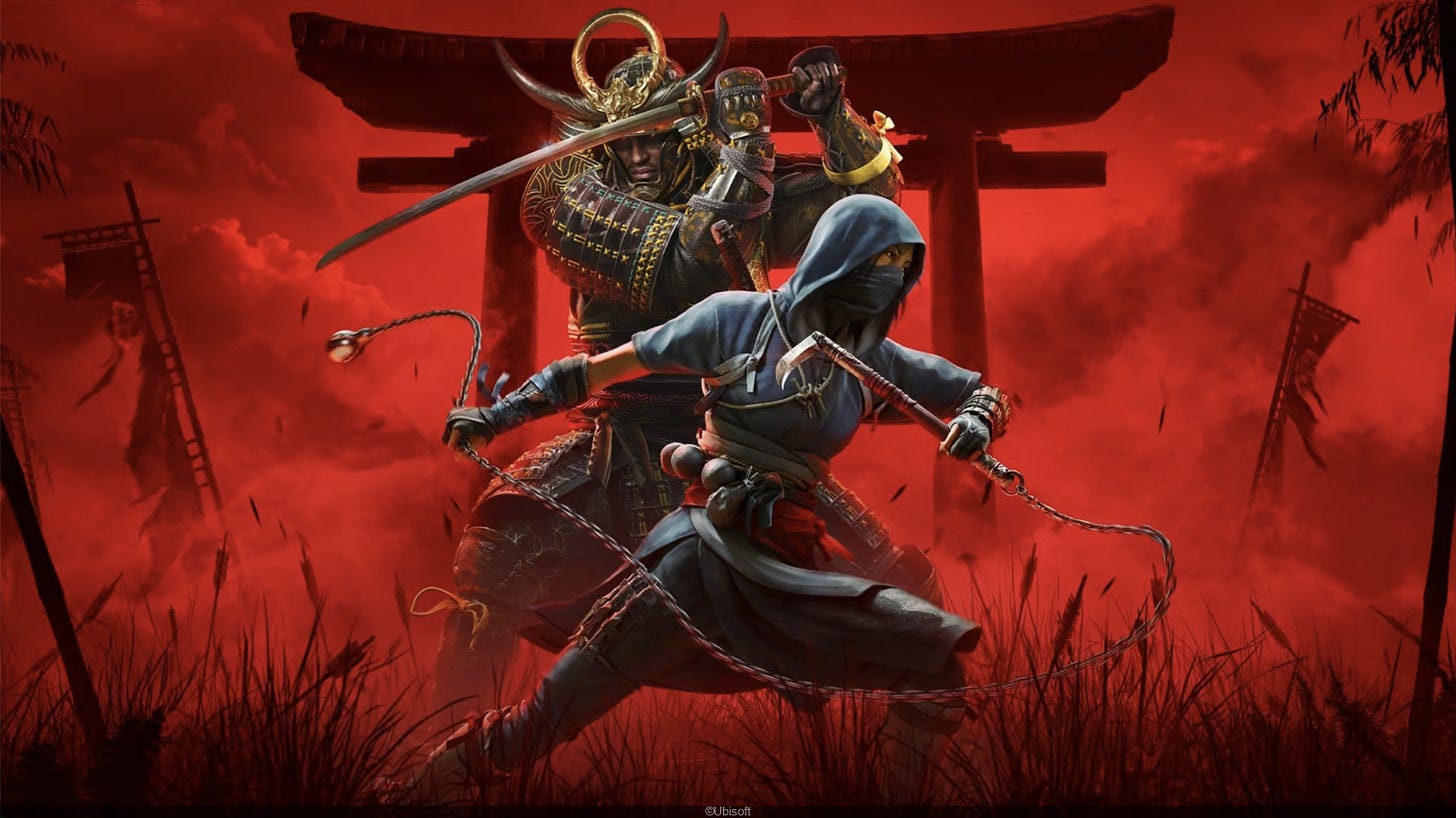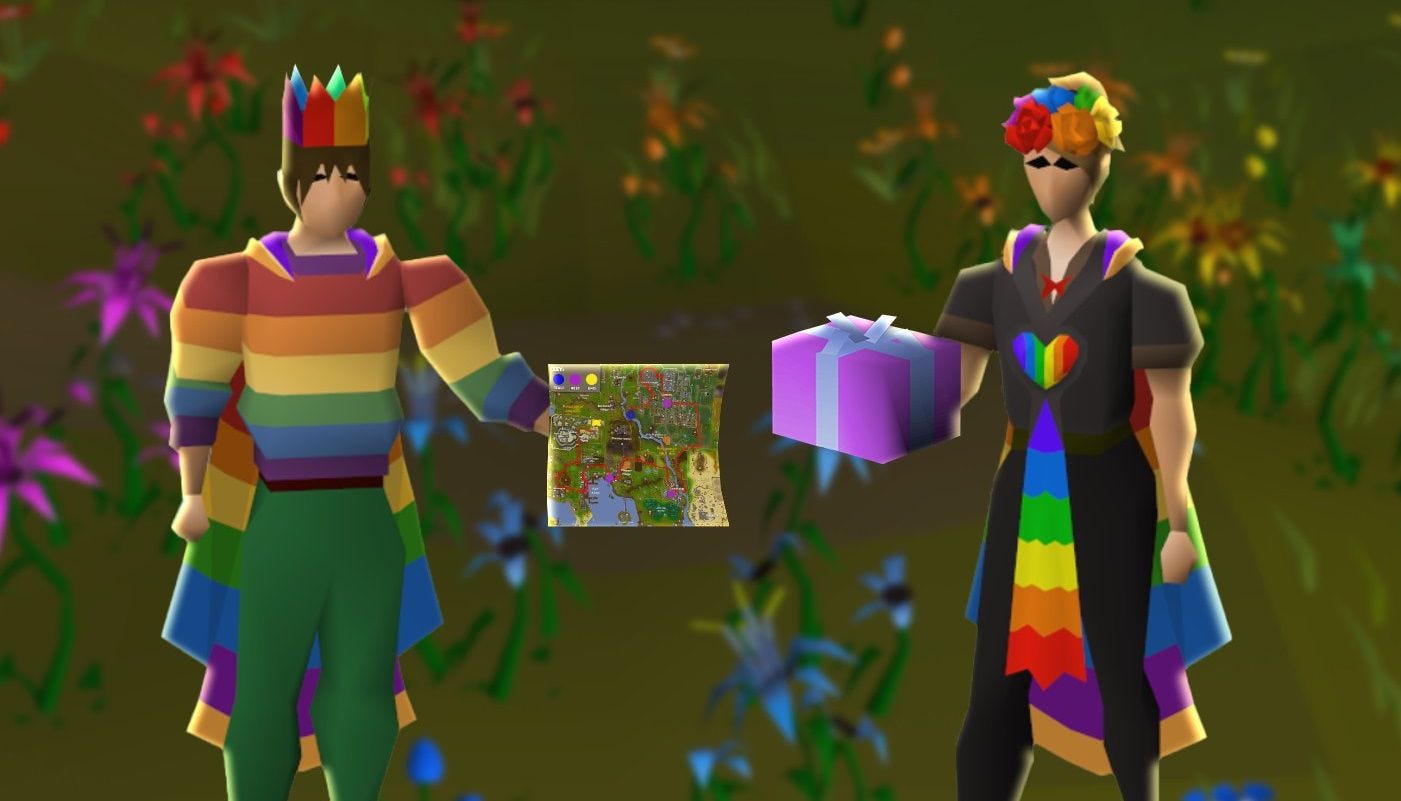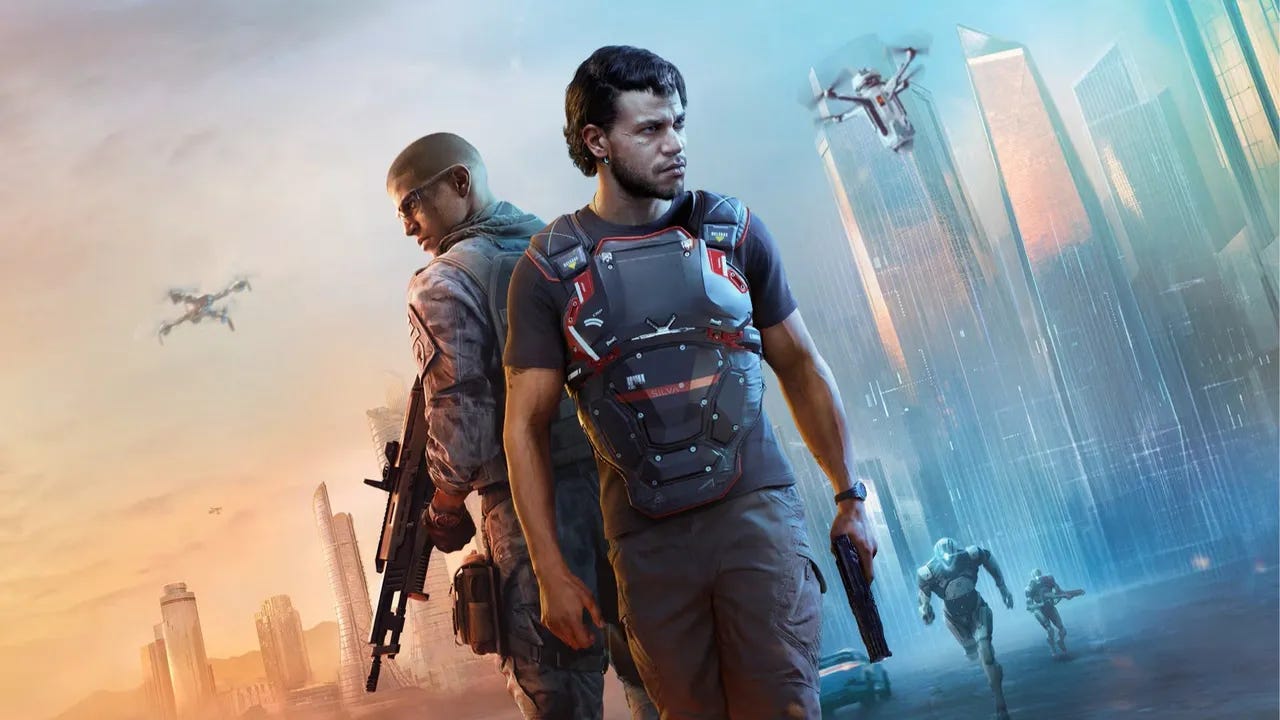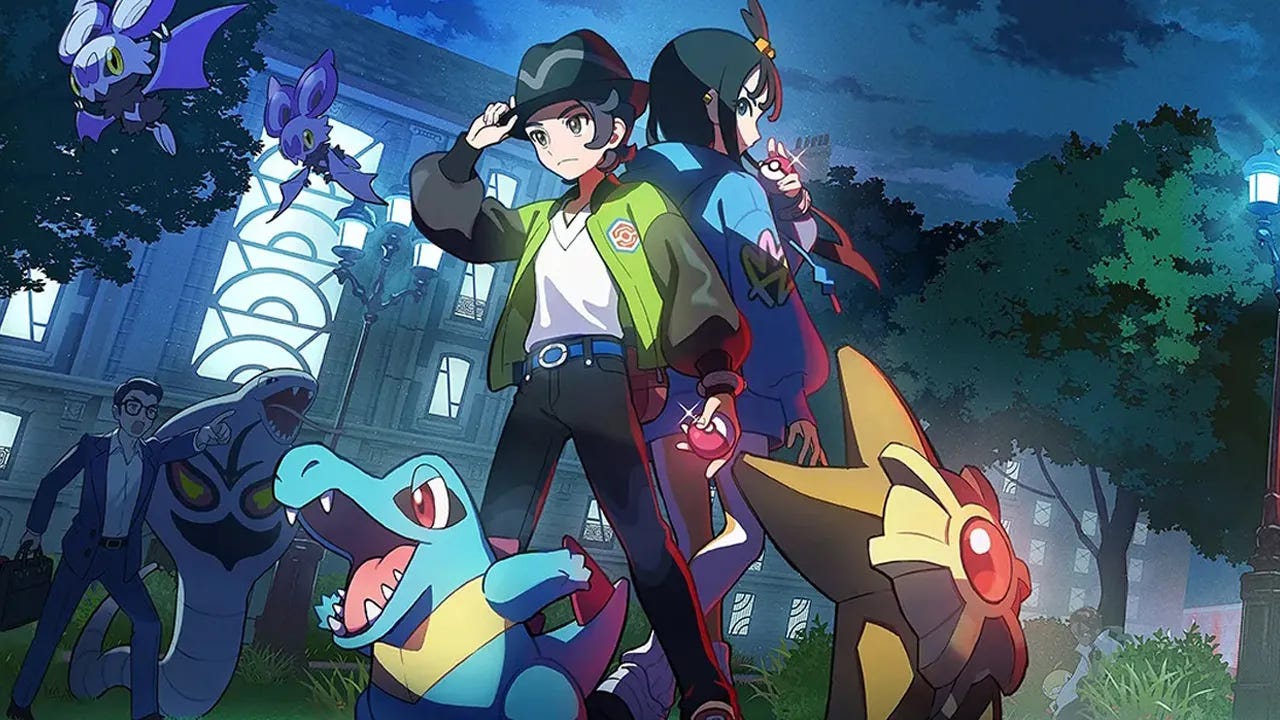The games industry’s self-censorship problem, 16/10/2025
Ubisoft, Roblox, and Jagex tongue-biting goes under the microscope
This week’s Video Games Industry Memo is sponsored by Sumo Digital.
An industry leader in providing end-to-end game dev solutions
Why video games are a new front for self-censorship (and how we stop it)
UK trade associations push for boosted video game tax relief for smaller projects
Go forth and catch them all in the biggest release of the week
Hello VGIM-ers,
This week’s newsletter is all about what we do and don’t say in public. That means it is a perfect week to plug a load of events that I’ll be speaking at in the weeks ahead.
I’m going to be hosting the business half of Playing for the Planet’s Green Games Summit on November 6th. Register here if you fancy coming along.
I’ll be heading to Belfast’s Media Festival the following week to talk about something fun between 11th and 13th November. I’ll let you know more about the schedule soon.
Then, I’m joining VGIM readers Keith Stuart, Meghna Jayanth, and Anna Hollinrake for a chat about video games in the age of content abundance at the British Screen Forum’s conference on 19th November in London. Members can register via its website now.
And finally, I’m following up on hosting an excellent roundtable for Moore Kingston Smith by running a panel about the future of IP and brands in games at their exclusive event on 25th November. Contact the team here if you’d like to attend.
The big read - The games industry’s self-censorship problem
Someone call the Gamergaters: The video games industry has been getting itself into a twist over ‘political’ content within its games a lot lately.
Rap sheet: Last week, Stephen Totilo’s GameFile reported that Ubisoft had pulled an Assassin’s Creed game set in Reconstruction America over concerns about the current political environment. Roblox was criticised by industry inclusivity groups for adding a ‘sensitive issues’ tag to experiences on the platform that feature themes such as reproductive rights, marriage equality, and equitable pay in sports. And Jagex CEO Jon Bellamy has been pilloried by, erm, me after suggesting the company may stop creating Pride content following noisy player backlash.
Mitigating statements: In each case, the businesses involved have attempted to suggest that the decisions to limit content are either reflective of what its player base wants or, in the case of Roblox, provide them with information to make informed choices about what they play. The reality is simpler. Video game businesses, like other companies across the world, are responding to an increasingly authoritarian political culture by self-censoring themselves or the spaces they manage.
Negative effects: By doing so, they’re weakening the hold of democratic values such as freedom of speech, freedom of expression, and freedom of assembly within digital spaces. And it is time for the industry to recognise that it needs to protect that right, rather than cede it too easily to those who want to take our rights away from us.
Shutting up
Defining terms: Self-censorship is an insidiously effective weapon. Liberties, which describes itself as a watchdog safeguarding freedoms across Europe, defines it as the decision to censor your own speech because you’re afraid of the repercussions of saying something (or you’re pressured not to). This gradually leads to a suffocation of the democratic conversation, as people choose not to take part in it.
Spreading fear: Autocrats and the autocratically-minded love self-censorship because it does their job for them. By imposing a culture of fear from the top down, such as arresting dissidents or encouraging its supporters to attack its critics, it creates the conditions for people to self-censor from the bottom up. This stifles dissent without the powers that be ever getting involved. This provides plausible deniability about its role in eroding democracy in the process. And even though most readers of this newsletter currently live in a democracy, self-censorship can also pave the way to autocracy.
Weighing them up: When it comes to games and self-censorship, each case is a little different. Despite sharing some similarities, Ubisoft, Jagex, and Roblox’s self-censorship each has a slightly different flavour to it.
Censoring content: In Ubisoft’s case, the company’s leadership is self-censoring the narrative content of its games to protect itself from racist backlash. Totilo reported that executives became nervous about the concept of the game, which would see a formerly enslaved black man “fight for justice in a conflict that would…see him confront the emergence of the Ku Klux Klan,” after backlash against the inclusion of a playable black samurai in Assassin’s Creed: Shadows. It released a statement suggesting it had cancelled the game to protect its employees. A source speaking with Totilo said the decision actually showed the company would “take no stand, no risk” in its creative decision-making.
Censoring expression: Over at Jagex, a change of leadership seems to have prompted its self-censorship drive. In 2024, the company came under pressure from an online campaign that sought to push back against the inclusion of different sex options and pronouns within the game. It refused. A year later, shortly after the appointment of Jon Bellamy as the company’s new chief exec, the company scaled down its Pride plans as a result of player pressure. In September this year, in an interview with Games Industry Biz, Bellamy claimed that Pride content was “controversial in a way it didn’t used to be.” This appeared to be as much rationale as he was willing to provide for the “tough decisions” to limit player expression in a game that’s all about maximising player expression.
Passing the buck: And over at Roblox, the emergence of a ‘sensitive issues’ tag shows how self-censorship decisions can be passed down the chain. Unlike Jagex or Ubisoft, Roblox has at least maintained its commitment to allowing content that features ‘sensitive’ themes on its platforms. But a large number of those ‘issues’ seem to be defined as a problem by people on the Trumpian wing of the political discourse. And by labelling certain topics as ‘sensitive’, it simultaneously penalises developers for talking about them and discourages players (or their parents) from engaging with them: paving the way to self-censorship.
A message from our sponsor, Sumo Digital: The handheld gaming space enters a new chapter this month with the release of Xbox’s ROG Ally and Ally X.
Understanding the power of pocket-sized platforms has been a fundamental aspect of Sumo Digital’s development history since 2003.
Learn their take on the latest handheld console in their recent article: Pocket Power: How Handheld Continues to Reshape the Gaming Landscape.
Apolitical trap
A touch naive: Each game is reinforcing self-censorship in different ways to differing extents. But each company, and much of the wider games industry, does this because they’ve fallen into the trap of thinking games can be apolitical. Jagex bigwig Bellamy, for example, literally said this out loud when he said that “the continuity and operation of our games as apolitically as possible” was his top priority in response to the Pride content backlash.
Selective interpretation: However, Bellamy is wrong for several reasons. Some of them are internal to Jagex. The company is publicly committed as a founding partner of the UK video games industry’s RaiseTheGame diversity initiative, which makes its Pride position a touch awkward. But more pertinently, Old School Runescape runs regular in-game votes amongst its community to allow the player base to vote on content updates. To have a literal democracy running within your game and claiming your space isn’t political is absurdist humour worthy of Tim Robinson.
Community challenged: But externally, modern games can’t be apolitical because they serve as a hub around which communities congregate. Where people come together to play, they talk. When they talk, they develop identities and ideas. Those identities and ideas typically transform into group dynamics. And those dynamics encourage communities to campaign on causes both inside their subculture and outside of it in the wider world. This naturally leads to game communities developing political identities, in exactly the same way that other groups like football fans or ravers do.
Perverse incentives: By bringing millions of people together and giving them tools to express themselves, game businesses have created space where cultural and political ideas grow. Therefore, imposing a stance of ‘no politics’ or ‘apolitical’ on players, developers, and communities doesn’t lead to a happily neutral world where no one talks about it. Instead, it does two things. It quietens the majority of rule-abiding players and communities, who are concerned about transgressing. And at the same time, it increases the influence of groups who don’t care about the rules, who campaign aggressively to promote their political perspectives, and who harass those who don’t agree with them. In short, it hands groups like Sweet Baby Inc. Detected a loudspeaker while encouraging everyone else to turn the volume down, distorting our medium’s culture to become illiberal, intolerant, and undemocratic.
Rocky road: And by empowering groups who make self-censorship the norm, actual censorship becomes much easier to accept. Steam, for example, has become a real boon to autocrats. Its light-touch content moderation policy, which only removes content deemed to be illegal or “trolling”, means it consistently allows hate groups and foreign propagandists to post games or run communities on its platforms in democratic circles because they just toe the legal line. But in countries like Russia, it’ll happily bend over backwards to remove content on behalf of state censors - transforming it into an active supporter of the state’s autocratic goals in the process. Grim.
Problem solving
Context is king: So, what’s to be done about the rising tide of self-censorship in games? We need to accept that the problem goes much wider than the industry. Game companies are self-censoring because, well, that’s what’s happening in democracies at large. It’s important to pretend that this isn’t an ‘us’ only problem, or that our response to the problem is becoming so political that we stop being fun (I’m looking at you, the Kamala Harris Fortnite map).
On the frontlines: However, we’ve known since Gamergate happened that games are the frontline of digital culture. That means companies have a responsibility to push back against self-censorship, rather than reinforce it. And businesses can do that, if they’re courageous enough to take action.
Suggested course: Ubisoft could, frankly, grow a bit of a backbone, assert the rights of its developers to create freely in peace, and kick back much harder against bad-faith community members whose concerns over ‘historical accuracy’ don’t include the time the series featured a tank designed by Leonardo Da Vinci. Jagex needs to feel confident enough to keep running Pride content within its game, or be encouraged to step back from projects like #RaiseTheGame if the business no longer supports an inclusive industry. Roblox, meanwhile, could ditch the sensitive issues label, use its network of child psychologists to determine appropriate age ratings for content issues, and instead argue that its creative tools are a new front for free speech in modern society. That’s a powerful narrative for the company to embrace, if it wants to grab it.
Best in class: We also need the industry to follow the example of, and celebrate, businesses that hold their ground. Publisher No More Robots, for example, had to face down a harassment campaign directed against the developer of Little Robot Lab, which had the temerity to celebrate women working in Science, Technology, Engineering and Mathematics. Rather than giving in, it backed the devs, doubled down on its message, and turned its fire against people maliciously attacking it. The response was brave. It was effective. And it shows that we can push back malicious, censorious behaviour - if we have the confidence and conviction to do so.
Stop it: The only way for the games industry to turn back the self-censorship tide is to stop self-censoring. We need to be brave. We need to recognise the rights of our developers and players to enjoy games freely. And we need to give no quarter to those who pressure us to shut our mouths. Otherwise, games risk becoming a sadly self-censored medium that fails to represent the spirit of play that drives the industry forward or the billions of players who want to be truly free to play.
News in brief
Build A Lawsuit: Independent Workers of Great Britain (IWGB) union is pursuing legal action against Build A Rocket Boy, the studio behind MindsEye. The open letter, which was signed by 93 employees and ex-employees, estimates that 250-300 workers in the company have lost their jobs as a result of mismanagement. It also alleges that the company mistreated staff, forced people to work extreme overtime, and engaged in a “disastrous handling of redundancies”.
Home Grown Games: Ukie is calling on British games companies to request the Government introduce a Games Growth Relief for the upcoming Autumn Budget. The relief, which would provide a boost to the existing Video Games Expenditure Credit for projects with budgets of less than £15m (with tapering support for projects up to £23m, could reportedly create 1000s of jobs, and a return of “up to £482m in annual GVA. Submissions to sign the letter are closed, but lobbying continues behind closed doors.
Don’t F*** About, Do F***ing Answer: The EU’s Digital Fairness Act Consultation closes next week, shortly after Ilkka Paananen from Supercell took a pot shot at it. I’m going to take a closer look at the consultation’s dodgy design in tomorrow’s Playing Politics. But for now, read Dr Celia Pontin’s piece about what the act actually is (and make sure you respond to the consultation before 24th October, or risk enraging Celia forevermore).
Nether-Ending Adaptations: Warner Bros. has greenlit a sequel to their MCCU (Minecraft Cinematic Universe), which will release on 23 July 2027. The first Minecraft movie failed to dazzle the critics, but earned over a billion dollars at the box office. Will the sequel offer fans another easter-egg egg-filled extravaganza that allows them to happily ignore reviewers? Only time will tell.
Fun in the Summer: Geoff Keighley has confirmed that Summer Game Fest will return next year from 5th June, this time in a new venue. The live event, which opens up the ‘Not E3 video game showcase season, is heading to Hollywood’s Dolby Theatre. Given that it’s taking place roughly two weeks before my book launches in the States, I’m already having ideas about how to promote Power Play that are well above my station and, frankly, my budget.
A message from our sponsor, Sumo Digital: With pocket-sized platforms, playing virtually any game on the go means that the barriers to gaming are down, and handheld is in demand.
That’s why Sumo Digital is putting their years of innovation, expertise and success to good use by helping their partners plan, develop and execute their ambitions for this new dawn for handheld gaming.
Learn more in their latest article: Pocket Power: How Handheld Continues to Reshape the Gaming Landscape.
Moving on
Marc Berry Reid is now Chief Financial Officer at DIVA Agency… Lisa Kneidl joins Larian Studio as PR Manager… Joost Van Dreunen begins his new position as Strategic Advisor for ELO… and Sól Rós Hlynsdóttir starts her role as Associate Brand Manager for IO Interactive…And Jon Hicks is the new Editorial Director at Games Industry Biz…
Jobs ahoy
SEGA is in the market for a Senior PR Manager… Total War is gunning for a Senior Brand Manager… Sing King is seeking a Mobile Games Producer… Naughty Dog needs a well-behaved Producer stateside… Ubisoft is now hiring for a Director of HR, Communications…
Events and conferences
Twitchcon, San Diego - 17th-19th October
Games Industry Conference, Poznan - 23rd-26th October
Paris Games Week, Paris - 30th October-2nd November
Gamescom Asia, Singapore - 30th October-2nd November
AI and Games Conference, London - 3rd-4th November
Games of the week
Pokémon Legends Z-A - Explore Lumiose City, move around in real time during battles, and unlock Mega Evolutions in Nintendo’s latest handheld adventure.
Just Dance 2026 - Band together with your buddies and boogie out to a fresh batch of bangers… and… squints and rubs eyes… All Star by Smash Mouth.
Escape from Duckov - Waddle into all-out duck warfare in this delightfully cute PVE looter-shooter.
Before you go…
Love long reads about the design of video games? Well, we’ve got a new publication to tip for you.
Design Room is a new outlet from Matt Leone, featuring chunky 10,000-word stories stuffed full of interviews with game creators about the making of the biggest titles in the business.
Check out the first major piece for the site, an oral history of Shadow of the Colossus, here.
Thanks to Anna Mahtani for production support on this week’s Video Games Industry Memo.







